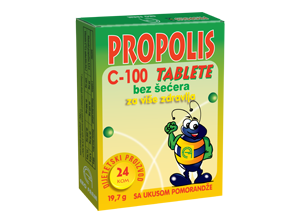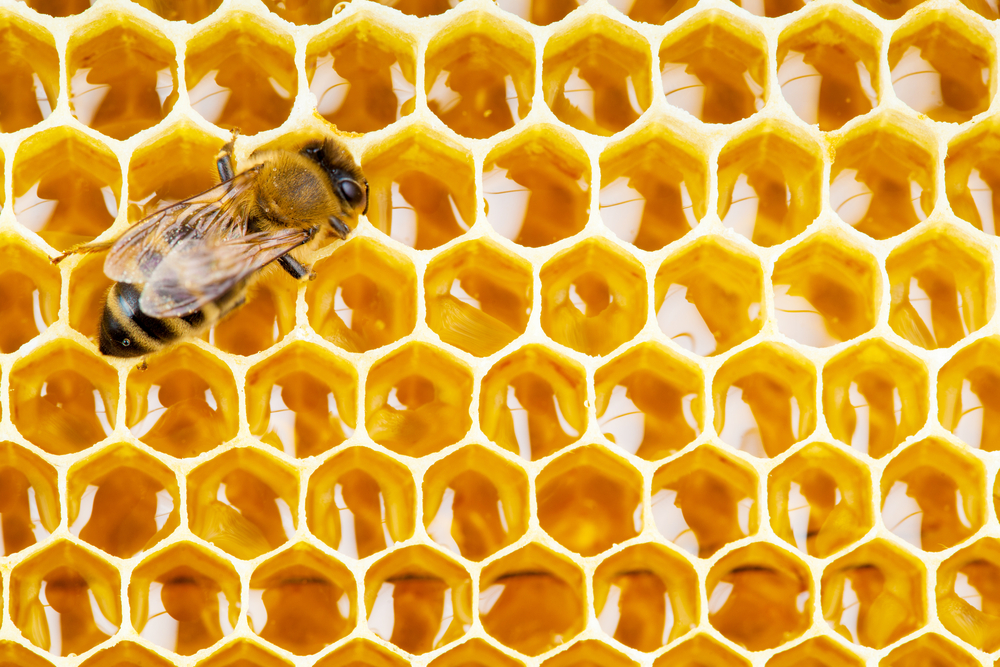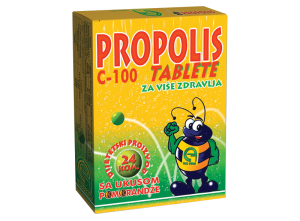What is propolis?
Propolis is a natural resinous mixture, that is collected by honeybees (Apis mellifera) from various plant sources (leaf buds, barks and sap flows) and then mixed with beeswax and glandular bee secretions. A colony of bees collects on average between 150 and 200 g of propolis in one year and they use it to seal the gaps and cracks in the hive and maintain the inside temperature. Thanks to its antimicrobial activities, propolis also protects the hive from bacterial, viral and fungal infections. Above room temperature (˃20 ̊C), propolis is soft, pliable and very sticky, however, when cooled and frozen, it becomes hard and brittle. Its colour varies from green to brown and reddish, depending on its botanical source.
Chemical composition
Detailed analyses show that the chemical composition of propolis varies considerably depending on the plant source, geographical region and seasonal collection time. Substances usually found in raw propolis in the North Temperate Zone include approximately 50% resins and vegetable balsams (polyphenolic fraction), 30% beeswax, 10% essential oils, and 5% bee pollen. It also contains vitamins (B complex vitamins, provitamin A, vitamin C and vitamin E), minerals (calcium, magnesium, iron, zinc, potassium, phosphorous, manganese, cobalt and copper), sugars, enzymes, aldehydes, ketons, alcohols and steroids. At least 180 different compounds have been identified in propolis so far. Nevertheless, a large number of components remain unknown and require further research.
Biological activity
Propolis has a broad spectrum of biological activities, among others antimicrobial, antioxidant, anti-inflamatory, immunomodulatory, antiulcer and antitumor, which is the reason it has been used by humans as a traditional folk medicine since ancient times. It recently gained popularity as a natural product that may be potentially used as a therapeutic agent to improve health and prevent various human diseases. Propolis-based products are broadly marketed as over-the-counter preparations, dietary supplements, food and (bio)cosmetic products.
Therapeutic uses
It is effectively used in treatment of upper respiratory tract infections, caused by gram-positive bacteria (Streptococcus sp., Staphylococcus sp.), such as common cold, tonsillitis, pharyngitis, rhinitis and sinusitis. Numerous studies showed synergistic effect between propolis extract and selected antibiotics in treating infections. Propolis enhances effectiveness of antibiotics, shortens the period of recovery and most important, it does not cause resistance in the body and damage of the intestinal microflora.
Propolis extracts are widely used in dentistry, in the treatment of mucous membranes and gingivae, dentinal hypersensitivity, deep parodontopathies, oral candidiasis and in oral surgery (treating dry socket after tooth extraction).
It can also be effective for the treatment of various skin conditions, including acne, eczema, cold sores, psoriasis, burns, ulcers, age spots, dry scalp, athlete’s foot and fungal nail infections.
Several studies show that using propolis as a cream or ointment is more effective than acyclovir and placebo (vehicle) ointments in the treatment of genital herpes (HSV type 2).
Propolis has potential therapeutic role against neurodegenerative diseases.
Possible side effects
Although generally very safe, propolis potentially may be very dangerous to those who have allergies to bee stings, honey or tree pollen and may cause severe allergic reactions. People who suffer from asthma and other allergies should also be very careful in taking propolis. Women who are pregnant or nursing should consult their doctor before using propolis-based products.
by: mr ph Iva Majstorović, posted on October 8, 2014
Change of seasons is an ideal time to catch a respiratory, or any other infection due to low immune function. Therefore, we should not wait for symptoms of cold and illness to appear, but think about the ways to prevent them, and to maintain health. A completely natural resinous substance, which is collected only by the selected worker bees, and whose beneficial effects have been used for thousands of years, can help us greatly. Maybe you have already guessed – it’s the bee propolis.
 Propolis C-100 without sugar is a dietary supplement based on propolis extract of high biological value and vitamin C, which contribute to normal function of the immune system. Propolis is a natural mixture of resinous substances, which is collected by honey bees (Apis mellifera) from different plant sources such as buds, leaves, and plant sap, and mixed with beeswax and other secretions. It is of great importance for bees, because it protects the hive from bacterial, viral and fungal infections, due to its antimicrobial activity.
Propolis C-100 without sugar is a dietary supplement based on propolis extract of high biological value and vitamin C, which contribute to normal function of the immune system. Propolis is a natural mixture of resinous substances, which is collected by honey bees (Apis mellifera) from different plant sources such as buds, leaves, and plant sap, and mixed with beeswax and other secretions. It is of great importance for bees, because it protects the hive from bacterial, viral and fungal infections, due to its antimicrobial activity.

